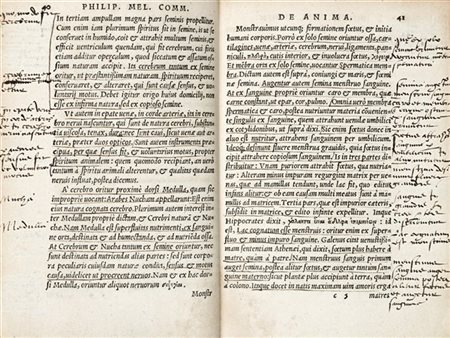 Il Ponte Casa d'Aste - Palazzo Crivelli - Via Pontaccio 12, 20121 Milano
Il Ponte Casa d'Aste - Palazzo Crivelli - Via Pontaccio 12, 20121 Milano
ASTA 519: LIBRI E MANOSCRITTI I TORNATA DAL LOTTO 1 AL LOTTO 182
martedì 21 settembre 2021 ore 10:30 (UTC +01:00)
MELANTONE, Filippo (1497-1560) - De Anima. Lione: Sebastiano Grifo, 1542. Copi
MELANTONE, Filippo (1497-1560) - De Anima. Lione: Sebastiano Grifo, 1542.
Copia arricchita dalle interessanti annotazioni di un frate penitente che data la nota di possesso al frontespizio al 9 luglio 1573. Melantone, protagonista della riforma protestante al fianco di Lutero e Calvino, pubblicò per la prima volta il De Anima nel 1540 a Strasburgo con il titolo di Commentarius de anima. Il libro si basa sull'opera omonima di Aristotele ed è ricordato come uno dei primi trattati in cui la mente, o spirito, è ritenuta degna di studio scientifico; fu infatti proprio Melantone a coniare la parola "psicologia" e l'opera non riguarda solo la mente, ma tratta in generale la fisiologia umana, i sensi, gli umori e varie idee astratte, l'immortalità, il libero arbitrio, l'intelletto ecc. Di particolare interesse è il fatto che l'opera circolasse ancora nel 1573 e che venisse studiata a fondo e annotata dal frate penitente.
8vo(161 x 116mm). Marca tipografica al frontespizio e in fine (piccola riparazione al margine interno inferiore, alcune bruniture). Pelle del XVIII-XIX secolo decorata a spruzzo, titolo su etichetta al dorso, tagli dorati (difetti alle estremità). Provenienza: antiche annotazioni - ex libris con piccolo ritratto fotografico.
-EN
MELANTONE, Filippo (1497-1560) - De Anima. Lyon: Sebastiano Grifo, 1542.
Copy enriched with interesting annotations by a penitent friar who dates the ownership note on the title page to 9 July 1573. Melanchthon, protagonist of the Protestant reform alongside Luther and Calvin, published the work De Anima for the first time in 1540 in Strasbourg. The book is based on the homonymous work of Aristotle and is remembered as one of the first treatises in which the mind, or spirit, is considered worthy of scientific study; it was in fact Melanchthon who coined the word "psychology" and the work does not concern only the mind, but deals in general with human physiology, the senses, moods and various abstract ideas, immortality, free will, the intellect etc. Of particular interest is the fact that the work was still in circulation in 1573 and that it was studied in depth and annotated by the penitent friar.
8vo (161 x 116mm). Printer's device on title and at end (small repair to lower inner margin, some browning). 18th-19th-century speckled calf, title on red label on spine, gilt edges (some rubbing). Provenance: early annotations - small photographic portrait as exlibris.




